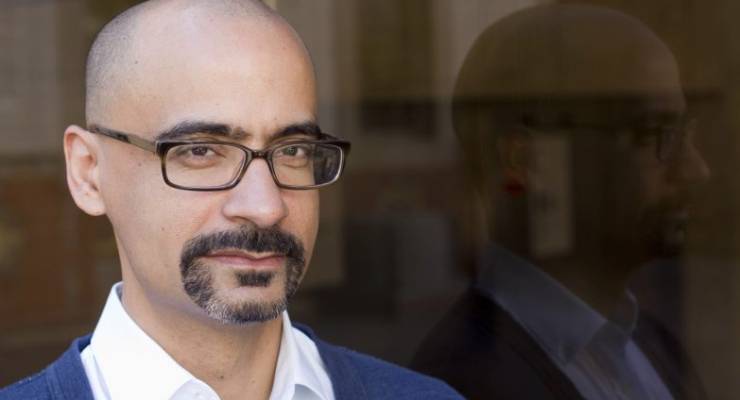
In the main bar at Carriageworks, home of this year’s Sydney Writers’ Festival, there was only one topic of conversation — US writer Junot Díaz and the women who accused him of assaulting her, Zinzi Clemmons. Following the very public accusation, why did the organisers issue a statement potentially defaming Díaz? Did nobody run it past a lawyer?
It all unfolded on Friday afternoon, as Diaz and others were on stage discussing their reading lives. Clemmons, a writer and fellow guest of the festival, stood up in question time; without identifying herself, asked him why he had treated her the way he had six years ago. The moderator, Ashley Hay, was blindsided by the question and, appropriately, quickly shut the discussion down. The event ended, but in the ensuing hours, Clemmons repeated her accusations on Twitter, saying that Díaz had forcibly tried to kiss her when she was a graduate student. This was followed on Twitter by other women saying that Díaz had publicly argued with them or forcibly disagreed with their point of view. The internet blew up.
By the next morning, Diaz had decided to go back to the US, and he and his partner were on their way to the airport. At 10.15am on Saturday, the festival issued a curious statement.
Following the allegations of inappropriate and aggressive behaviour towards Zinzi Clemmons and other women, Mr Díaz has withdrawn from his remaining sessions at Sydney Writers’ Festival.
In his recent New Yorker essay, Mr Díaz wrote, “Eventually the past finds you”. As for so many in positions of power, the moment to reckon with the consequences of past behaviour has arrived.
We remain committed to ensuring that (the sharing of stories) occurs in a supportive and safe environment for our authors and audiences alike.
Did it not occur to anyone at the festival that this statement had defamed Diaz? It’s a very poor precedent for the festival to allow Diaz to flee the country and metaphorically kick him in the arse on the way out. After this incident, what male writer would fly around the world to come to Australia? Why not put Diaz in front of an audience to take questions — aren’t argument and debate the whole point of a literary festival?
It was a great week, though, with highlights including a stunning event with Julia Gillard, in conversation with ABC journalist Laura Tingle. Gillard was at her best — warm, witty, erudite; filling us all with regret. Why didn’t she show this side of her when she was Prime Minister, would it have made a difference?
Like many successful people, however, Gillard doesn’t look back and relished talking about her latest project, the Global Institute for Women’s Leadership with Kings College London, where she is the inaugural chair. The institute is looking at obstacles to gender equality and empirical data on which strategies are known to work.
Interestingly, she said that early research had shown that the current model of unconscious bias training was not very effective and can merely reinforce people’s stereotypes. “We want to do a major evaluation of these programs.”
She said she was pleased to support the #metoo movement, hoping that it would expand to include non-famous people, “like one of the migrant workers who clean buildings like this one.”
“If #metoo ultimately makes a big difference, it will mean something for that woman who gets harassed in that workplace.”
She also discussed the attitudes to Hillary Clinton, who was at the height of her popularity as Secretary of State. This changed when she said “I want to be the boss,” she said.
“Women are seen much more favourably when they are number two, three, four, but when they are challenging for number one,” it all changes, Gillard said.
In addition, “likeability” correlates with leadership in a man, but not in women, she said.
A panel on #metoo on Saturday afternoon, expertly wrangled by the Wheeler Centre’s Sophie Black, included local writer Tracey Spicer and US journalists Irin Carmon and Jenna Wortham. It’s contained some unsettling insights, including the unwelcome news that #metoo investigations were much more difficult in Australia due to our draconian defamation laws.
My other highlights included Jason Steger’s interview with the author of Pachinko, Min Jin Lee, George Megalogenis’ conversation with Janesville’s Amy Goldstein and Louise Adler’s session with journalist Sarah Ferguson, who has written a tiny jewel of a book about the death of her mother, called On Mother. At the end of the talk, she asked us to go home and ring our mothers, so I did. “Mum”, I told her, “it’s been a great festival.”
“But if these years have taught me anything it is this: you can never run away. Not ever. The only way out is in.” – Junot Díaz, The Brief Wondrous Life of Oscar Wao
“So we beat on, boats against the current, borne back ceaselessly into the past.” – F. Scott Fitzgerald, The Great Gatsby








We understand the danger of putting things in print. That Sydney Writers Festival fails to grasp it is delicious irony.
HYPOCRITE
She said she was pleased to support the #metoo movement, hoping that it would expand to include non-famous people, “like one of the migrant workers who clean buildings like this one.”
Perhaps Gillard should done something for these women & men who are 100% exploited by employers? Women like Gillard and Cathy Jackson (theif & union secretary HSU) were too self absorbed building their own careers at the detriment of workers who paid their union dues and should have expected better.
If a writers’ conflab is not about transgression – “We remain committed to ensuring that (the sharing of stories) occurs in a supportive and safe environment for our authors and audiences alike.” – then it is unclear whether “aren’t argument and debate the whole point of a literary festival?“.
Yes, debating the topic with all participants would have been my preference (but I love a good argument t!)
Ah, sadly nothing can be debated when everything is (increasingly) deemed to be defamatory. And maybe the debate could start with, hands up, who’s actually read This is How You Lose Her? This was the Diaz book that really lost me …
Julia Gillard suggests that Hillary Clinton’s popularity suffered after she reportedly said “I want to be the boss”, because she was a woman.
She then goes on to offer the generalisation that “women are seen much more favourably when they are number two, three, four, but when they are challenging for number one, it all changes”.
Why is it so difficult for Gillard to accept that maybe people were just turned-off by Clinton’s public arrogance or naked self-serving ambition? Where is the evidence that the alleged public response had anything to do with her gender?
It is my experience that if you approach an issue with a closed mind, nothing will ever change it.
While I don’t for a moment condone any of the sexist & misogynistic abuse that was heaped on Gillard as Prime Minister, I have been on the receiving end of bullying, intimidation, harassment & worse, perpetrated by a senior female executive & I can assure Gillard that there are plenty of nasty & ugly women out there.
It doesn’t matter what the topic, we can always rely on the femocrats to turn it into a gender debate. Celibacy and seclusion, this last twenty years is a gift from heaven!
I realise that Crikey is a ‘blokey’ publication and perhaps this means that all its writers are obliged to take the ‘blokes’ line on everything. But it’s disappointing that all you can come up with from the Sydney Writers’ Festival is more woman shaming … and quotes from two male authors. (The second one of whom – while, yes, great books – plagiarised his wife’s work and locked her in a lunatic asylum. Oh, and F Scott is dead … so don’t worry dead men cannot sue.)